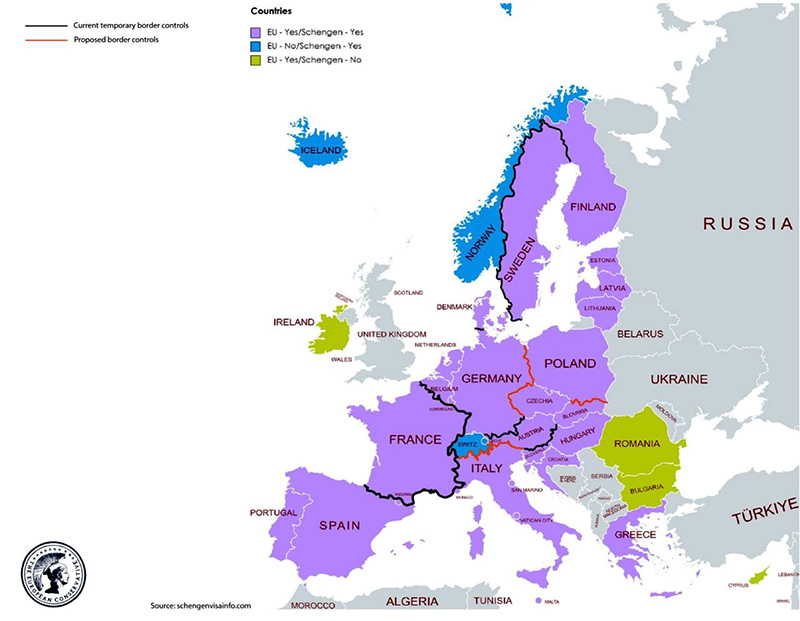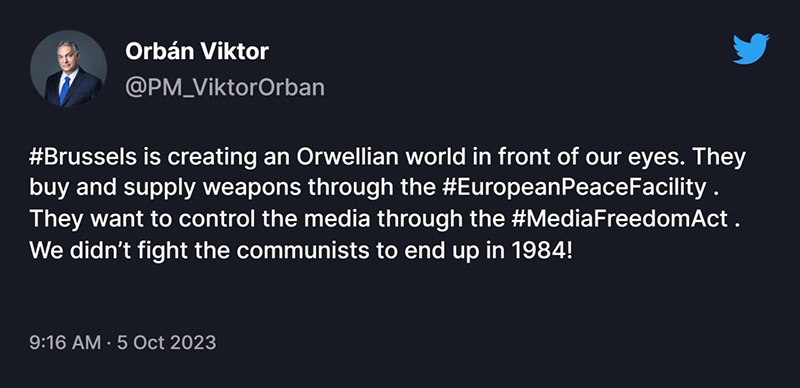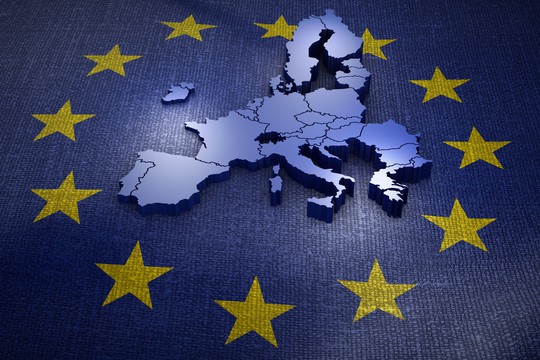Every new generation has refashioned the EU according to the politics of the age, notes Timothy Less, a lead researcher at the Centre for Geopolitics’ project on Disintegration Studies (UK).
Western Europe is pursuing a contradictory policy, declaring a commitment to both enlarge the EU and integrate its members ever deeper, in opposition to the wishes of its electorates. Will the region's turn to the political right herald a refashioning of the EU into a looser body, in which states such as Ukraine can find their place?
After years of opposition, political leaders in the EU’s western European core have finally backed a further round of enlargement and the prospect of membership for its hinterlands in the east.
In September, the presidents of the European Commission and the European Council both made speeches calling for the EU to prepare itself for the addition of up to nine new members from the Balkans and former Soviet Union, potentially as soon as 2030.
This was followed by a strategy document commissioned by France and Germany, the ultimate arbiters of the European project, setting out the nature of these preparations if the EU is to be ‘enlargement ready’. Meanwhile, Spain, has announced a summit in October to work out the means of further enlargement ahead of a European Council meeting in December, which may open talks on membership for Moldova and Ukraine.
This reversal in their thinking comes in response to Russia, whose policy has changed the strategic calculus in western European capitals. The foremost issue is the need to do something with Ukraine, which cannot be left to fend for itself when the fighting eventually subsides.
Inevitably, the rest of Europe will bear responsibility for securing and reconstructing the country, for which integration into the EU offers an obvious means, following in the path of Ukraine’s central European neighbours who underwent a transformation in the 1990s and 2000s as the EU took them under its wing.
The strategic calculation runs wider, however, than the question of rehabilitating Ukraine. Russia’s actions in the last eighteen months have made clear the vulnerability to Moscow’s ambitions of the other unintegrated parts of eastern Europe, which can no longer be maintained as a grey zone buffering Russia and the EU. These include former Soviet republics, such as Georgia, where Moscow has successfully maintained a pro-Russian government, and Moldova, where it is trying to create a similarly pro-Russian regime, against the wishes of the current pro-European administration.
Russia’s influence also extends into the Balkans, where it has backed the Serbs in their ongoing contest with their neighbours, most significantly in Bosnia, where Serbs are pushing for greater autonomy in the face of threats from Bošnjaks, but also in Serbia itself, which is resisting efforts by a Western-backed Kosovo to establish its independence.
More broadly still, Russia’s invasion of Ukraine has provided seeming confirmation that the world is entering a period of great power competition in which the EU must strengthen its international position to stand its ground against rising powers such as China and avoid becoming a supplicant to the US.
Eastward enlargement offers one means to achieve the stated goal of establishing a ‘geopolitical EU’, increasing its territory by a quarter, its population by more than fifty million and, with the integration of Ukraine, incorporating massive tracts of additional agricultural land, reserves of mineral and rare earths, and a large new industrial base.
Conversely, a failure to enlarge risks weakening the EU, as Poland and its neighbours are forced to assume primary responsibility for Ukraine with the help of the US and the UK, deepening the EU’s east-west division and allowing the ‘Anglo-Saxon’ countries to undermine the EU’s position in eastern Europe by establishing themselves as the dominant external powers.
Accordingly, leaders in the European core have at last come round to the opinion of their counterparts in the east, which have long supported the EU’s further enlargement as a means to stabilise their neighbourhood, reunite with stranded diasporas, secure their investments in the Balkans and Ukraine, and integrate states that share their commitment to national sovereignty, at the expense of the more liberally-minded west.
The quid pro quo of the western Europeans’ newfound enthusiasm for a ‘widening’ of the EU is a revival of two long-standing demands. One is for the EU’s ‘deepening’, a feature of the enlargement debate dating back to the 1990s, which reflected concerns in western Europe about preserving the EU’s integrity as its membership expands.
The second, more immediate, issue is one of functionality, given the risk of institutional paralysis, with as many as thirty-six member states gathered around the table in the European Council who must agree by qualified majority, and sometimes by unanimity, before decisions can be passed collectively. Underlying this is a basic political interest in retaining the pre-eminent position of the western European core – particularly of France and Germany – which suffered a setback with its expansion to the east in the 2000s and has only been partially restored following the departure of the UK, which previously constituted an alternative centre of power.
Meanwhile, in milder form, the Franco-German strategy paper proposes various changes to decision-making procedures in the Council, most importantly ending the right of individual member states to veto decisions and instead subjecting these to a revised form of qualified majority voting, which reinforces the power of the EU’s larger states, most of which lie in western Europe.
The second demand – again a long-standing feature of the enlargement debate – is that the authoritarian, corrupt and, in some cases, politically dysfunctional aspirants in eastern Europe must meet strict conditions before they can be allowed to enter the EU in what is presented as a ‘merit-based’ process of accession.
…It's funny that in Europe the most flexible thing is the borders of different countries. This video shows how Europe has changed over the centuries. The tradition goes by and by. Watch how 1000 years of European borders change. Time Lapse Map:
Every new generation has refashioned the EU according to the politics of the age. During the Cold War, hard-headed realists established the European Economic Community as a capitalist free-trade zone in opposition to the communist Council for Mutual Economic Assistance in the east.
With the Cold War’s end, a new generation of liberal idealists took control of the European project and established the EU, a highly-integrated quasi-federation with aspirations to statehood, whose members shared institutions, a currency and a flag while abandoning national sovereignty in a swathe of policy domains from the economy to immigration.
Now, in the shifting circumstances of the 2020s and 2030s, the EU is likely to be refashioned once again under the stewardship of conservatives which reflects their particular political priorities. Some elements will probably remain the same, such as a basic free-trade zone within the EU. States may co-operate more deeply in some areas where they share common interests, such as combatting illegal migration and promoting what they see as a threatened European identity.
The power of the European institutions will be curtailed and veto rights tightened to prevent Brussels compromising core national interests. The single market will take on a more voluntary character, with its various precepts becoming more advisory in nature. States will abandon the free movement of labour and the passport-free Schengen arrangements. The Eurozone will be reorganised, allowing countries which cannot thrive inside it to make an orderly exit. The whole system of financial transfers inside the EU, from Target II payments to cohesion funds and agricultural subsidies, will be rolled back radically.
This is not merely speculation. In many respects, this vision of a new United Nations of Europe is already coming to pass. The Schengen zone has partially collapsed under the strain of illegal immigration (pic.):

Frontex is rigorously enforcing the EU’s external borders, and the EU is striking deals with neighbours to end migration flows.
At the same time, the EU itself will have greater reason than ever to integrate the east. Conservatives will share their liberal counterparts’ wish to bind the unintegrated parts of eastern Europe to the west as a means to stabilise the region and contain Russian expansionism. They will be keen to admit the ethnically-homogenous and Christian countries to the east to strengthen European civilisation in the face of mass migration and the rise of non-European powers.
As a matter of politics, conservative governments will also be keen to prevent backsliding into liberalism by incorporating new countries committed to conservative values and national sovereignty, and permanently tipping the balance of power within the EU in their favour.
Such a union will be anathema to the liberal politicians who currently wield power in western Europe and their large support base. They face the prospect of a diminished EU, which falls far short of their vision of a borderless, multicultural Europe under powerful central institutions that lock in their ideals and values. Inevitably, they will continue to use their residual power to preserve the old EU and insist on its further integration, diminishing the prospects of it ever enlarging, Timothy Less concludes.
…It looks like they in Britain are happy to be away from these problems. But problems of a different kind are spreading and being the core part of the Western policy in the world London witness them no matter Britain is no longer EC member.
P.S.
read more in our Telegram-channel https://t.me/The_International_Affairs

 10:31 06.10.2023 •
10:31 06.10.2023 •























